
Washington Stories
Gabrielle Bouska
Erik Ruf-WA My adventures with stomach cancer began in July 2019, when my sister Ingrid was diagnosed with Stage 4 diffuse stomach cancer. A vibrant, fit 52-year-old, she had shown no symptoms other than a few months of difficulty swallowing and feelings of fullness in her stomach. By the time her cancer was discovered, it was too widespread to allow the usual combination of aggressive chemotherapy and total gastrectomy (complete removal of the stomach). We were told that her only hope was to join a clinical trial, but none of the hundreds of available problems sought her particular kind of stomach cancer. Instead, Ingrid was administered "palliative" radiation and chemotherapy designed to slow cancer progression and keep her more comfortable. Both made her miserable; she suffered from almost continuous nausea and pain from the moment the treatments began until the day she ended them and checked herself into a hospice to die. Ingrid passed away in late December 2019.
This story doesn't end with Ingrid's passing. Because some stomach cancers are hereditary, several of my family members and I chose to have genetic testing. I was found to carry a mutated form of the CDH1, the gene which, among other things, dramatically increases the risk of contracting diffuse stomach cancer. As a result, I had a detailed endoscopy and, less than a month after Ingrid's passing, was found to share her cancer, but at a much earlier stage, 1A. In March 2020, I had my stomach wholly removed. Total gastrectomy is a complex surgery with a lengthy recovery period, and patients are required to make lifelong changes in diet, exercise, and nutritional supplementation. I had severe complications, but as I write this essay 22 months after surgery, I am doing well. My oncologist believes I am cancer-free, but we can't be sure; I will be monitored for at least five years. What do these two cancer cases tell us? First, early diagnosis is vital. I survived stomach cancer because my sister's illness prompted my genetic testing and subsequent early intervention. We need not only better tools for early detection but also the education of clinicians in when and how to use them. Second, once cancer is detected, we need better ways to stop it along with more compassionate treatment for those we are unable to cure. Stomach cancer is an awful disease; all of the issues listed above deserve your consideration for funding.
